- Home
- Elizabeth E. Wein
Rose Under Fire Page 3
Rose Under Fire Read online
Page 3
Doodlebug Bride / Bomb Alley
(Poems by Rose Justice. Not yet written. I just like the titles.)
Maddie had her two days off for her wedding, but I did not, so it was kind of a marathon for me to get to Scotland. I managed to squeeze it in as a series of ferry flights up and took the train back with Maddie. Everyone was as nice as could be, bending over backwards to make sure I got the right delivery chits that would take me all the way to Aberdeen and let me stay there overnight. Mostly they were doing it for Maddie. Thank heavens the weather also cooperated. It has been terrible all summer; even the Brits say it’s not usually this bad. Great cover for the flying bombs, but no visibility for living pilots, and the ground-to-air gunners can’t see what they’re shooting at.
It was thick overcast as usual the day after the wedding when Maddie and I came back on the train together – poor thing, she and Jamie only had one night together. Maddie was in Scotland for two nights, but the night before the wedding doesn’t really count because she and Jamie were still in separate rooms then!
She is marrying into another world. Jamie is the son of an earl and his family lives in an honest-to-goodness Highland castle. Her name has changed from Maddie Brodatt to the Honourable Mrs Beaufort-Stuart! There are a lot of Beaufort-Stuarts – Jamie is one of six children, though the war is thinning them out. Ugh. His oldest brother was killed in Normandy in June and his younger sister was killed last year. She is the one who was Maddie’s best friend. It was through her that Maddie met Jamie.
I don’t know how Lady Beaufort-Stuart copes – I really don’t. She has got eight refugee children living with her – all boys, evacuated from Glasgow so they won’t be bombed (for the wedding they all wore kilts borrowed from the Beaufort-Stuarts). Before the wedding this rabble formed a chain across the church door and refused to let anyone in until the bridegroom paid them, which Jamie staunchly refused to do, arguing that if he could kick their soccer ball over the church, he was exempt from their entry fee – and he did it too, amid a huge amount of cheering and yelling. Maddie gave them each a sixpence anyway. Then they tried to carry her into the church, but her grandfather took over at that point and made her walk sedately down the aisle on his arm.
Jamie’s family didn’t talk much about their dead. They were so happy to have something to celebrate – almost desperate with it. There were flowers and champagne after all. They have got an amazing rose garden, like the one at the Hotel Hershey, and it hasn’t been dug up for vegetables because they have so much ground that there aren’t enough gardeners to take care of it all. So their own garden is where the wedding roses came from. And of course Jamie brought the champagne back with him on one of his clandestine Special Duties trips.
The church they were married in is part of the castle estate, a tiny crooked building built from local stone (the boys’ ball did not have to go very high to be kicked over the top of it). Maddie had white heather in her bouquet, and pink and yellow damask rosebuds. Jamie was in a kilt too, the same tartan as the eight kids, and his Royal Air Force tunic; Maddie wore her ATA uniform (so did I).
Her grandfather brought a wine glass that had been his mother’s in Russia, and Maddie and Jamie used it, instead of the traditional Scottish loving cup, for the couple’s first drink together at the reception afterwards. Then they smashed it, on purpose, as per her grandfather’s instructions. It was not a Jewish wedding, but Maddie’s grandparents are Jewish and breaking the glass is part of the ceremony.
Lady Beaufort-Stuart was rather shocked that Mr Brodatt had wanted them to break an antique Russian glass that had belonged to his mother, thousands of miles away and a century ago. And he said, ‘I do not want to wait for Hitler’s doodlebugs to get to it first.’
Maddie did not throw her bouquet. There would have only been me to catch it anyway, and we both knew how I felt about that. Instead she left it below the family’s memorial plaque in the church, where her friend’s name is carved. The older boy’s name is not there yet, but the girl died last year. Her dates were carved there too. And it was her birthday. They got married on her birthday, August 12th.
I like that. Because now they will have a reason to celebrate on that day, a new reason and a good one, instead of being miserable every year.
They didn’t mention the dead girl on the day, but Maddie said something about her on the train on our way back. It was when we were admiring Maddie’s ring. It is French rose-gold from the nineteenth century, a small, square-cut ruby flanked with little triangles of tiny pearls. It belonged to Jamie’s great-grandmother, and was handed down the generations eventually to his sister, and now Jamie’s family have given it to Maddie.
‘I love it fiercely,’ she said. ‘Because it is a little bit of Julie as well as Jamie, and of their lovely mother, and I will have it with me always. Fifty years from now, if I live that long, it will be part of me. It is all of ours and they are part of me. And I love that it is French too – their mother’s family is French – they are all fighting for France as much as for Britain. Julie too –’
Maddie shut up suddenly. But I got it, suddenly, and I knew that she’d meant me to get it – her friend died in France. She must have been a spy or a saboteur or something. Maddie is very discreet, but she is closer to that clandestine side of warfare than the other ATA pilots. She does a good bit of specialised taxi flying – like me taking Uncle Roger places, only Maddie’s passengers are incognito. I don’t ask who they are and I know she wouldn’t answer if I did.
Her friend Julie’s name is on the family’s memorial stone in Scotland, but I know Julie’s not buried in that church. Maddie said she didn’t get a funeral.
‘Do you know how she died?’ I asked.
‘Oh yes,’ Maddie answered. ‘I do. “Killed in action” means we know for sure. But I’ve often thought it would be worse if I didn’t know – if there hadn’t been a fight, the Nazis would have shipped her off in the dark to a concentration camp and never told anyone – that would have been worse. It doesn’t seem possible, but it would have been worse. We would still not know what had happened to her, eight months later, and the war’s not over. How long till we’d have found out? Would anyone have ever found out?’
I am making myself miserable thinking about it. I started writing in here because I would like to make Maddie a wedding poem. But it is hard when the wedding is in the middle of a war. Maddie is a Doodlebug Bride. Not for the ‘usual’ reasons, not because she and Jamie couldn’t hear their own vows over the rattling of approaching bombs, and not because we had to worry about whether she’d be able to run to a shelter in a wedding dress – we’d have worn our uniform slacks if we had worried about it, but the village of Castle Craig is very quiet! No, Maddie is a Doodlebug Bride because she spent part of the afternoon following her wedding day lying on the floor of a London bus hoping she wouldn’t get hit by a flying bomb.
London is covered in broken glass. Glass and dust. You can tell where the bombs have fallen by the piles of glass, which get bigger and bigger until you get to a hole in the ground where a house or a store was. More piles of glass are banked against the buildings that are still standing, and there are little paths cleared on the sidewalks. I thought it was bad around Southampton, but London is just a wasteland of wreckage. The trees have all lost their leaves in bomb blasts so that it looks like winter. Houses with no roofs and no windows have signs on the door that say ‘Still occupied’ to stop people looting them.
The train line down from Scotland to Southampton had been hit, so we got diverted to a different line and had to get off in London and take a bus to Charing Cross Station where we got on another train to try to go around the damage. The bus had no glass in the windows – they take the glass out on purpose – people would rather sit in the wind than risk windows exploding in their faces. Two V-1 flying bombs went over while we were on the bus, one of them passing close to the rooftops of the buildings – the driver just sped on. Not much else he could do, I guess! Anti-aircraft g
uns were racketing away too from somewhere pretty close by. Every single passenger on the bus, including me and Maddie, dove under the seats and lay there cowering.
There was a small boy, no more than three years old, just across from me. All the time we were on the floor he was shouting in terror, over and over: ‘Not on a bus! Not on a bus! MUMMY MUMMY NOT ON A BUS!’
His mother couldn’t do a thing – she just kept kissing him and kissing him – ‘Shh, shh.’ But he wouldn’t stop and it was more terrible to listen to than the clattering of the bomb as it passed over, terrible to hear such a little kid so frightened and not be able to do anything to make the fear go away. Because the thing he’s afraid of is real.
Maddie was just as bad. It surprised me – she always seems so confident, and so much older than me. She lay there next to me with her arms clamped over her head, absolutely shaking, and sobbing too.
When the bomb’s racket cut out we didn’t know if that was because we couldn’t hear it any more, or if the guns had got it, or if it was falling on us.
‘Count – count now –’ the young mother whispered to her kid. ‘All the way up to thirty and then you’ll be safe –’
I had my arm round Maddie’s shoulders, but she was still cowering with her arms over her head. I looked up at the little boy, with my hair just brushing the grubby underneath of the bus bench. Now I stopped worrying about the stupid bomb and lay there willing this kid to make it up to thirty.
‘25 – 26 – 27 – 28 – 29 –’
He got there at last, triumphant.
‘30!’
Everybody on the bus burst out clapping.
Then we all got up sheepishly and dusted ourselves off, because nothing had happened and we felt a little foolish lying on the floor while the bus sped through the empty Sunday streets.
Maddie still had her corsage of tartan ribbon and white heather and rosebuds from yesterday pinned on her uniform – actually, it had been part of the ceremony, pinning the family tartan on her. The flowers were very crushed and wilted. As we sat down again, she muttered, ‘No kiddies for me till after we’ve won the war, I think. Not that it’s likely! We were both out like lights the second we fell into bed. Just so tired all the time, you know? Thirteen days on duty and only two off, Spitfires coming and going as fast as the workshops can spit ’em out.’
I nodded. I’d been so tired I’d slept in my uniform. Well, I’d taken off my hose and tunic anyway. American slob!
‘And Jamie’s away to – well, he’s away now anyway,’ Maddie finished wistfully.
We made it safely to the train at Charing Cross – it is awful going in and out of Charing Cross, when you know perfectly well it’s the dead centre of London and probably the bullseye the Germans are targeting. But for me the most frightening thing happened after we got off the train at Hamble Station. We were walking along the branch line that takes trains down to the airfield except on Sundays (yes, we were walking back to the airfield on Sunday evening, because technically I was working that day and it would still be light for another five hours), and there were a couple of kids leaning over the wall by the tracks and yelling. They straightened up guiltily when they noticed us, but their pal who’d scaled the wall to get to the other side of the tracks didn’t realise we were there and gave himself away by shouting to his friends.
‘Oi, you lot – I’ve got another bit, but I need Rob’s knife back to cut these wires!’
The kids froze. We probably looked scarily official in our uniforms, especially Maddie with her First Officer’s gold stripes. The boys took a couple of steps back. One of them leaned over the wall and tried to shush his pal. And that made me look over the side of the wall to see what the other boy was doing.
He was taking apart a bomb.
Scout’s honour, that’s what he was doing. It was a flying bomb that hadn’t gone off. Sometimes they run out of fuel prematurely and just glide down, and occasionally they just don’t go off. It was much smaller than a Tempest or even a Spitfire, really no more than a bomb with wings. It had taken a couple of saplings down as it ploughed into the strip of waste ground at the edge of the railway, and now it was sitting on its belly by the train tracks, one wing missing and a long strip of the fuselage ripped open where it had connected with the trees. All of its innards were lying exposed to view and ready for small boys to come along and mop up souvenirs.
It must have just happened, or the railway would have already called the unexploded bomb people out to deal with it. The scavenging boy who wanted Rob’s knife was standing there with a shiny cylindrical metal case in his hand. It looked like a soup tin with the paper label missing. And, like he’d said, it was attached by a couple of wires to the inside of the bomb.
‘I’ve got the fuse!’ the boy yelled triumphantly, and then he saw me and Maddie staring at him with our mouths open.
The kid glanced around – there was no place to hide. He reached towards the wires inside the plane as if he was about to yank them free.
Maddie dropped her suitcase and tried to scramble over the wall. ‘Don’t pull! Don’t move! Just hold still –’
I beat her to it. I didn’t have a case, just my flight bag over my shoulder.
‘Don’t drop it –’
Maddie was yelling at me now. ‘Get him to put it down gently! There’s an electrical charge in the fuse and some of them are timed to go off after they’ve landed!’ She made it over the wall and was three steps behind me as we raced across the tracks. ‘That fuse could blow your fingers off on its own, you daft lad, even without being attached to a ton of explosive!’
Then the boy stood very still. He didn’t drop the fuse. He held it out to me across both palms. I remember thinking that this was hugely unfair of God and the universe in general, because now I had to take the fuse. I had got there first and it was mine.
For a moment we were stuck like that, a little boy and a big girl, holding the living heart of a V-1 flying bomb between us.
The silver cylinder had a type number stamped on the cap, and a manufacturer’s name: RHEINMETALL
Incredible to think that someone else’s fingers had fitted this destructive thing together, inserted the fragile switches and connected the wires and screwed on the cap, and now it was balanced ready to blow my own fingers off. Or this boy’s.
I took it from him very carefully.
‘Now scoot,’ I said sadly, because I really thought I was as good as dead.
As he handed it over, the wires simply fell free. They probably had been disconnected the whole time. At least if the fuse went off it wasn’t going to take the bomb with it.
‘Get out of here!’ I yelled at the boy.
He hurtled back across the tracks. As for me, my body acted on behalf of my frozen brain. I wound up for a pitch and hurled the fuse away from the bomb, away from the railway, into the scrubby thin woodland along the tracks.
It hit a beech sapling with a small crack and bang. Bits of bark exploded around the tree, and the trunk sagged – it bent right in half as though it had been caught in a tornado. It wasn’t a very big explosion. But we all saw it. Maddie crouched next to the wreckage of the bomb with her arms over her head, like she’d done in the bus.
I said to her, ‘Come on, Maddie – get away.’
I tugged her across the tracks and over the stone wall. Wouldn’t you know it, I tore my skirt going back over the wall when everything was safe again and not when I was racing to save a kid from blowing himself up! And unbelievably – or very believably, I guess, as my ten years’ experience of being a big sister to those hooligan twins Karl and Kurt ought to have taught me by now – the three boys were still standing there rooted to the spot, staring at the destruction with wide, excited eyes.
‘Would that have gone off in my hand, miss?’
‘How do I know? Maybe! Come on, you’ve got to let the authorities know what you’ve found. Come down to the airfield with us and make a proper report. Get going!’
Maddie pull
ed herself together and began to herd the boys along the road. ‘Go go go!’
The kids let themselves be bullied now, eyeing me respectfully. ‘You don’t throw like a girl,’ one of them commented.
‘That’s ’cause I played softball at school. Like baseball. Or cricket, sort of – none of us “throw like girls”.’
‘You a Yank?’ asked the boy who’d extracted the fuse, pointing to the ‘USA’ flash on my sleeve.
‘Obviously.’
‘You proud of it?’
Smart aleck.
I had to think about the answer to this question.
‘Yes,’ I said after a moment. ‘Yeah, I am.’
‘That bomb’s dead now, right, miss? A dead doodlebug –’ They all snickered. ‘That’s what the UXB teams do, they take out the fuse –’
I hesitated. I don’t know a lot about bombs. Maddie said, ‘Listen, that dead doodlebug’s still full of TNT, and if that fuse had gone off inside the aircraft, it would have blown you up and probably the rest of us too. What were you doing, playing UXB team?’
‘We saw it come down!’ one of them explained eagerly, and they all broke into grins. ‘We heard it and came running up to the station bridge to watch – Rob had his dad’s field glasses –’
(Crazy kids.)
‘– And we realised it was heading straight for us and we lay right down on the road next to the wall till the noise stopped, because we thought we were dead for sure!’
They were all still completely white around the gills, but they were enjoying themselves more than anything else. Ten-year-old boys are crazy.
We escorted them to the airfield and called out the local Air Raid Precautions warden. He was really nice to the kids, and took them along with him to watch from a safe distance as the road and railway were closed off in preparation for the UXB squad to come along and work their magic.
‘Does your Uncle Roger ever have to deal with unexploded bombs?’ Maddie asked as we watched them go. ‘Isn’t he in the Royal Engineers too, like the bomb squads?’

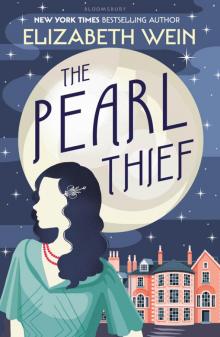 The Pearl Thief
The Pearl Thief Cobalt Squadron
Cobalt Squadron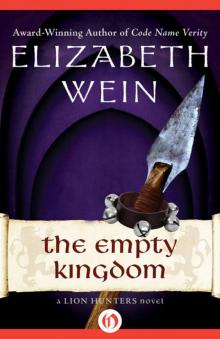 The Empty Kingdom
The Empty Kingdom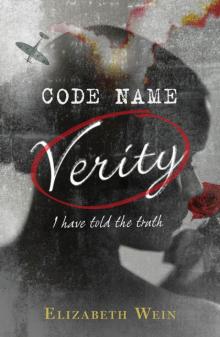 Code Name Verity
Code Name Verity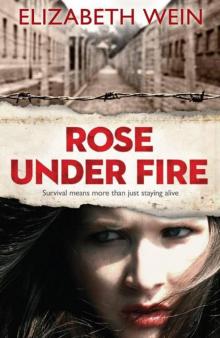 Rose Under Fire
Rose Under Fire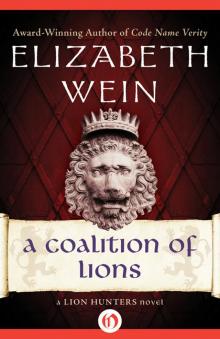 A Coalition of Lions
A Coalition of Lions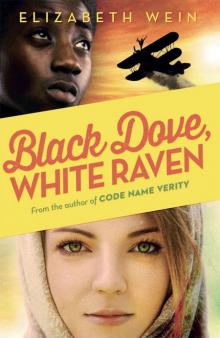 Black Dove, White Raven
Black Dove, White Raven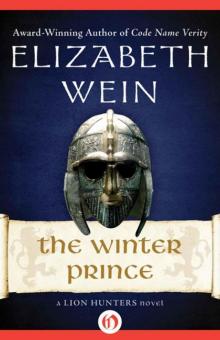 The Winter Prince
The Winter Prince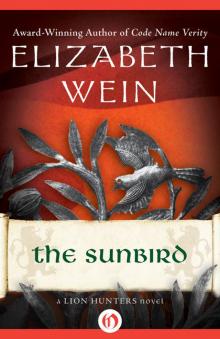 The Sunbird
The Sunbird